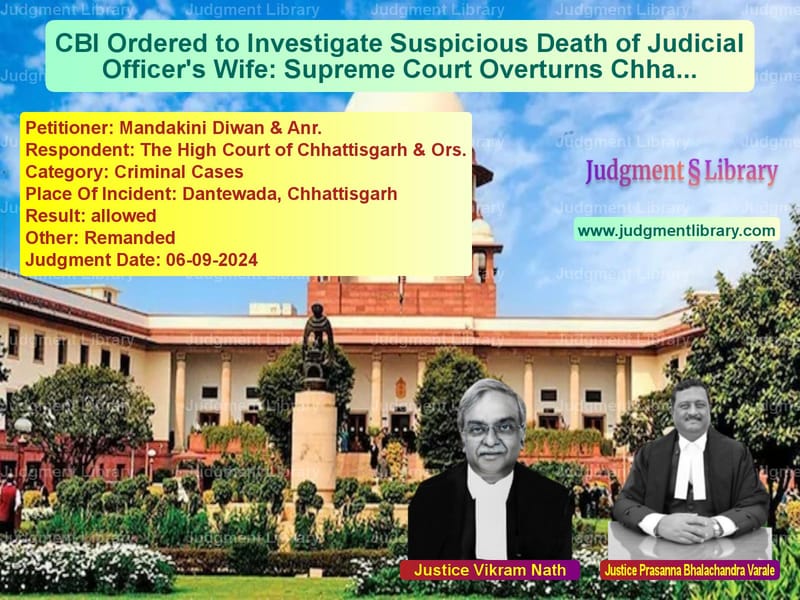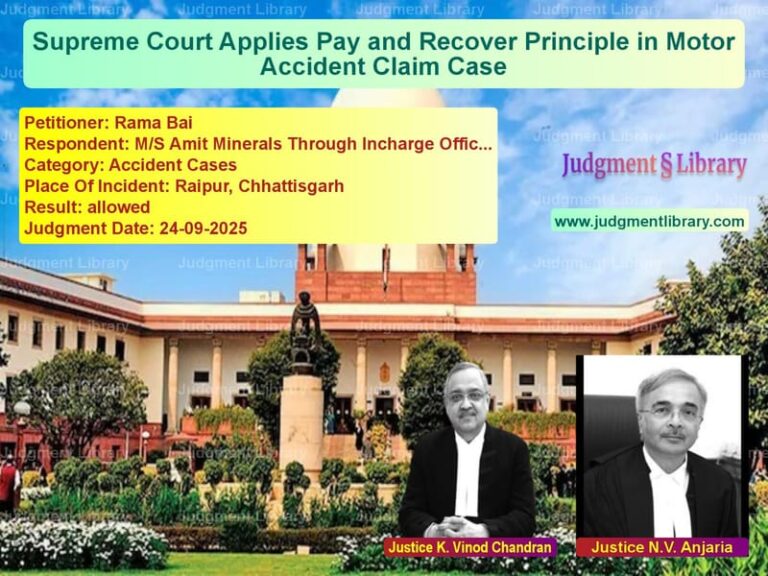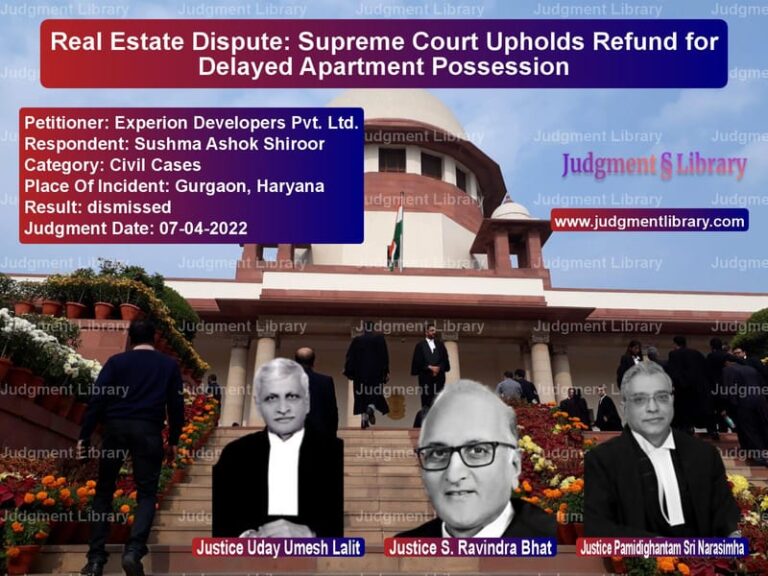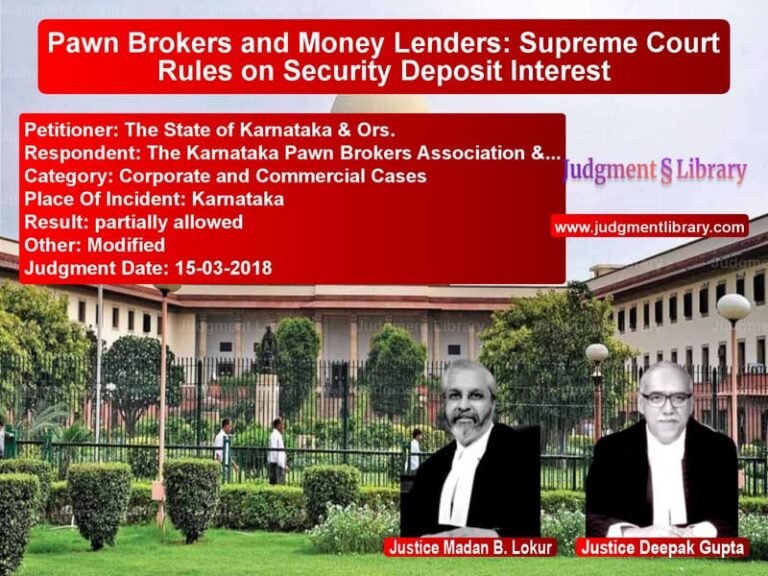CBI Ordered to Investigate Suspicious Death of Judicial Officer’s Wife: Supreme Court Overturns Chhattisgarh High Court Order
The case of Mandakini Diwan & Anr. vs. The High Court of Chhattisgarh & Ors. is a significant ruling that deals with the death of Ranjana Diwan, the wife of a senior judicial officer in Chhattisgarh. The Supreme Court, in its judgment dated September 6, 2024, directed the Central Bureau of Investigation (CBI) to conduct an independent investigation into the circumstances surrounding her alleged suicide, highlighting concerns over possible foul play and influence exerted by the deceased’s husband, who was a sitting judge at the time.
The judgment overturned the Chhattisgarh High Court’s decision that had refused to order a fresh investigation and had instead advised the petitioners to approach the magistrate under Section 156(3) of the Code of Criminal Procedure (CrPC). The Supreme Court emphasized the necessity of a fair and impartial investigation, especially when a high-ranking judicial officer was involved.
Background of the Case
The petitioners, Mandakini Diwan (mother) and Vikram Diwan (brother) of the deceased, alleged that Ranjana Diwan’s death, which was reported as suicide on May 12, 2016, was suspicious and required further investigation. The deceased was employed as an Assistant District Prosecution Officer and had married her husband, Manvendra Singh, in 2014. The couple had known each other since 2010.
According to the petitioners, they received a call around 10:30 PM on May 12, 2016, informing them that Ranjana had committed suicide. Upon reaching the scene from Bilaspur to Dantewada, they were not given access to the post-mortem report. They suspected foul play due to inconsistencies in the circumstances surrounding the death.
Key Findings from the Post-Mortem Report
The post-mortem was conducted on May 13, 2016, at 6:30 PM, and the report stated that the cause of death was asphyxia due to hanging. However, it also recorded six ante-mortem injuries:
- Contusion on the back of the right hand (3.5 cm x 3 cm, bluish)
- Contusion on the left ring finger (1.5 cm x 1 cm, bluish)
- Contusion on the right leg, below the knee (4 cm x 3.5 cm, bluish)
- Contusion on the left foot, dorsal aspect (1.5 cm x 1.5 cm, bluish)
- Contusion on the left thigh, 17 cm below the groin (4 cm x 4.3 cm, bluish)
- Ligature mark around the neck, described as a brown parchment-like hard mark above the level of the thyroid cartilage.
The injuries raised doubts regarding the suicide claim, as the report explicitly mentioned that they were inflicted within six hours before death. The family alleged that these marks indicated possible physical assault before the hanging.
Petitioners’ Arguments
The petitioners argued that:
- The police filed a closure report too quickly, treating the case as a suicide without conducting a thorough investigation.
- Despite multiple complaints, no FIR was registered against Manvendra Singh, the husband of the deceased.
- Given Singh’s judicial position, there was undue influence over the investigation, preventing a fair inquiry.
- They had no faith in the state police due to their repeated failure to act.
- There was sufficient evidence to suggest that Ranjana was assaulted before her death, warranting an independent investigation.
Respondents’ Arguments
The State of Chhattisgarh and the husband, Manvendra Singh, countered the allegations, stating:
- A detailed inquiry was conducted, including statements from more than 50 witnesses.
- All complaints by the petitioners were duly investigated and dismissed due to lack of evidence.
- The accusations against Manvendra Singh were baseless and intended to tarnish his reputation.
- The petitioners had the legal remedy of filing a case before a magistrate under Section 156(3) CrPC, making the writ petition unnecessary.
Supreme Court’s Observations
The Supreme Court reviewed the case and found multiple inconsistencies and concerns:
- Despite the presence of ante-mortem injuries, the police did not conduct a proper investigation.
- There was a possibility of undue influence due to the accused’s judicial position.
- When allegations of bias and interference arise, an independent investigation is necessary to ensure justice.
- The petitioners had legitimate apprehensions regarding the credibility of the state police’s investigation.
Key Judgment Excerpts
The Supreme Court referenced past judgments to support its ruling:
“It is our responsibility to ensure that the prosecution agency is reminded of its responsibility and duties in the discharge of its functions effectively and efficiently and ensure that the criminal prosecution is carried on effectively.”
“Where there is suspicion of influence, it becomes necessary to provide credibility and instill confidence in the investigation. This is where the role of an independent agency like the CBI is paramount.”
Final Judgment
The Supreme Court ruled as follows:
- The Chhattisgarh High Court’s decision was overturned.
- The CBI was directed to conduct a full-fledged investigation.
- The State of Chhattisgarh was ordered to cooperate fully with the CBI.
- If sufficient evidence was found, the CBI was permitted to register an FIR and proceed accordingly.
- If no evidence emerged, the CBI was allowed to close the investigation.
Implications of the Judgment
This ruling underscores key legal principles:
- Right to a Fair Investigation: The Supreme Court reaffirmed that every citizen is entitled to an unbiased probe, especially when powerful individuals are involved.
- Judicial Integrity: The verdict ensures that judicial officers are not above the law and must be held accountable like any other citizen.
- CBI’s Role: The Court emphasized that the CBI is a crucial institution for ensuring impartiality in cases where local law enforcement may be compromised.
- Precedent for Future Cases: The ruling provides a legal pathway for families of victims to seek independent investigations when state authorities fail to act impartially.
The Supreme Court’s decision brings hope for justice in the case of Ranjana Diwan’s suspicious death and sets an important precedent for similar cases in India.
Petitioner Name: Mandakini Diwan & Anr..Respondent Name: The High Court of Chhattisgarh & Ors..Judgment By: Justice Vikram Nath, Justice Prasanna Bhalachandra Varale.Place Of Incident: Dantewada, Chhattisgarh.Judgment Date: 06-09-2024.
Don’t miss out on the full details! Download the complete judgment in PDF format below and gain valuable insights instantly!
Download Judgment: mandakini-diwan-&-an-vs-the-high-court-of-ch-supreme-court-of-india-judgment-dated-06-09-2024.pdf
Directly Download Judgment: Directly download this Judgment
See all petitions in Custodial Deaths and Police Misconduct
See all petitions in Public Interest Litigation
See all petitions in Bail and Anticipatory Bail
See all petitions in Judgment by Vikram Nath
See all petitions in Judgment by Prasanna Bhalachandra Varale
See all petitions in allowed
See all petitions in Remanded
See all petitions in supreme court of India judgments September 2024
See all petitions in 2024 judgments
See all posts in Criminal Cases Category
See all allowed petitions in Criminal Cases Category
See all Dismissed petitions in Criminal Cases Category
See all partially allowed petitions in Criminal Cases Category







